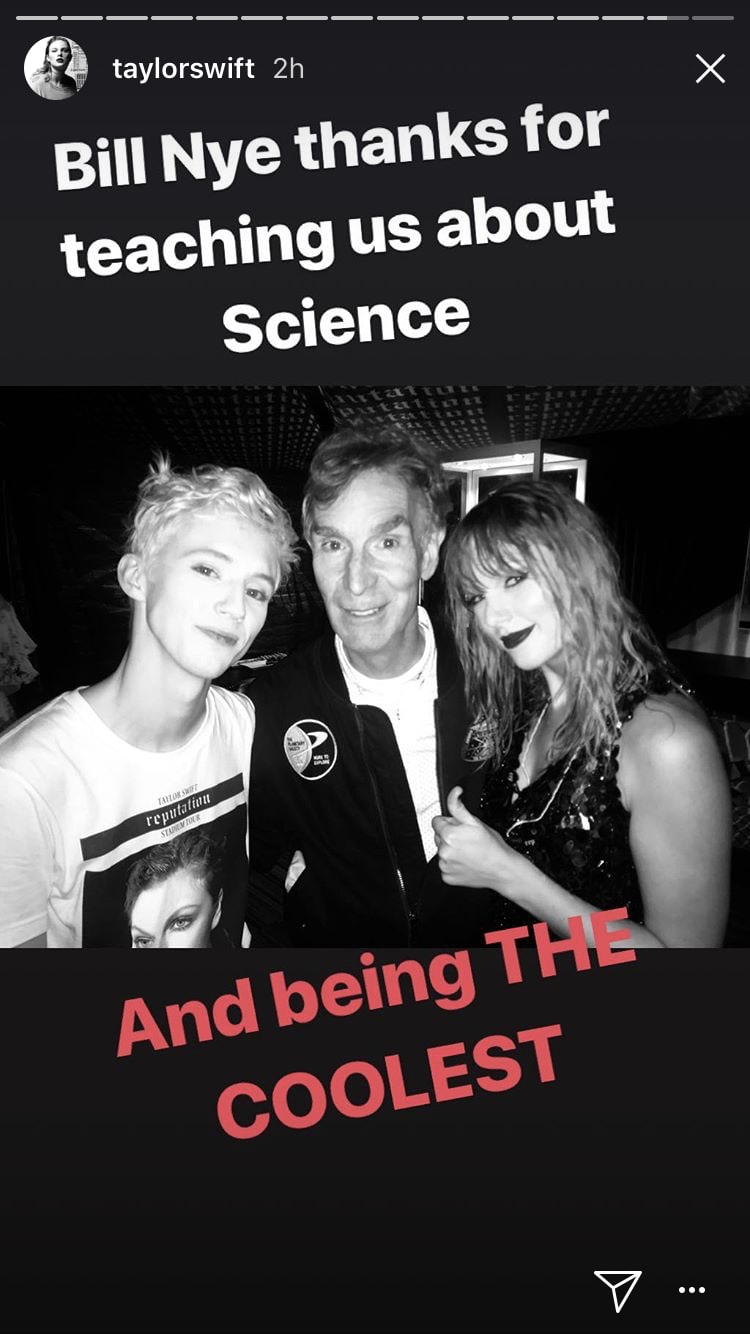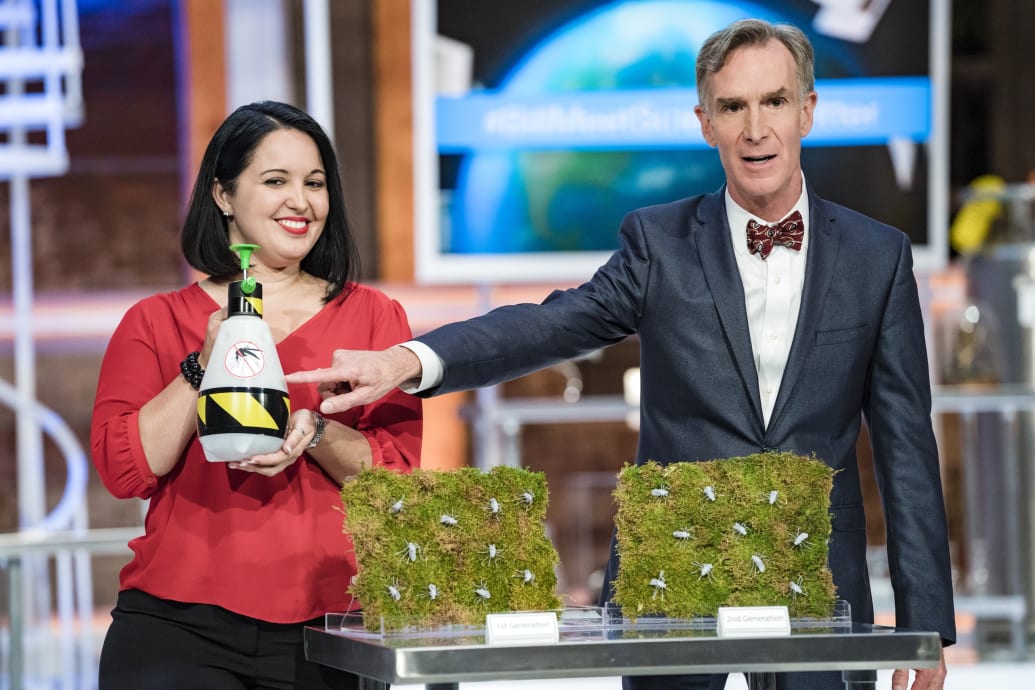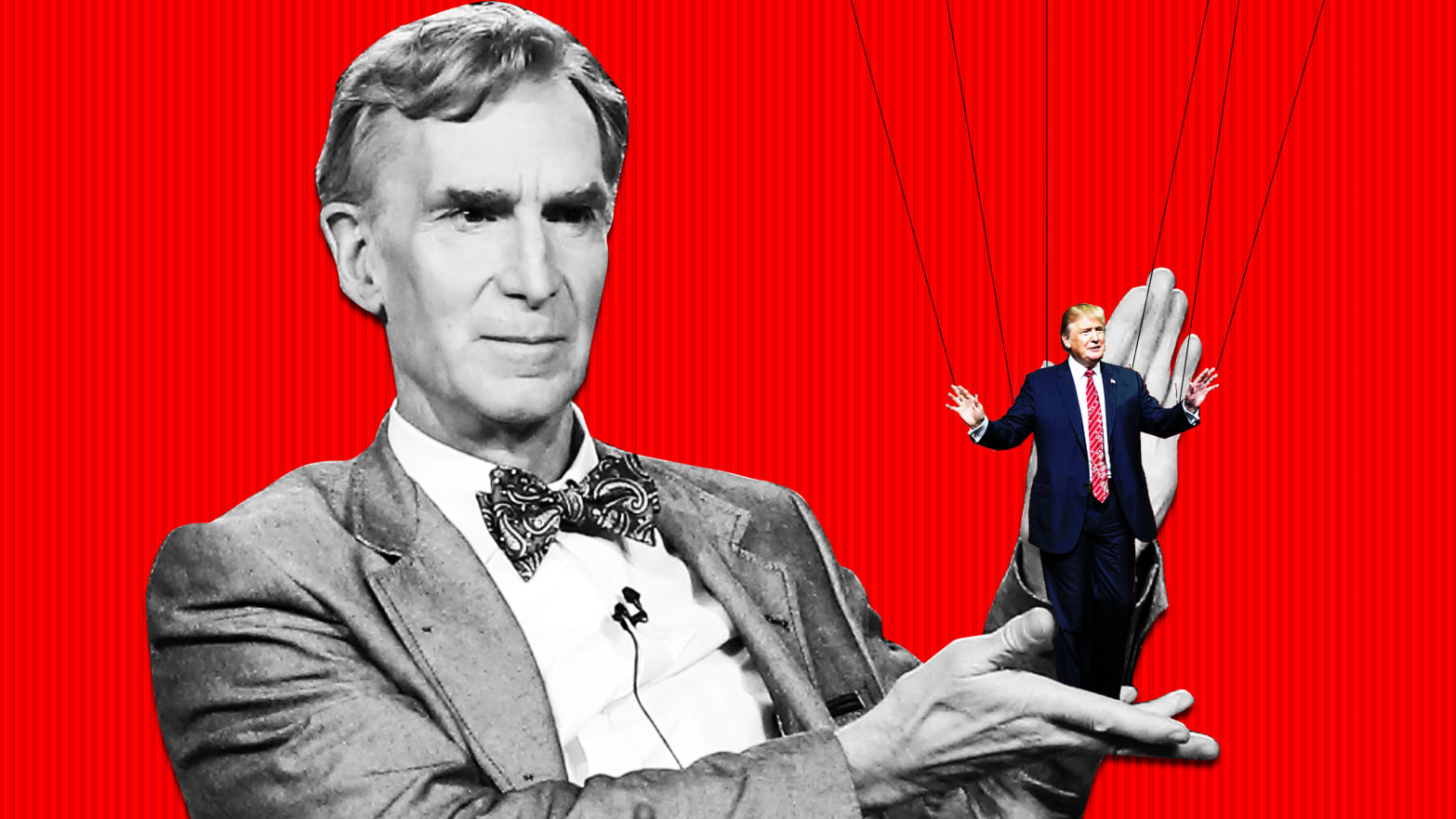We may not know whom she voted for—or her opinion of Donald Trump—but Taylor Swift has made one thing abundantly clear: she loves Bill Nye.
On Sunday night, the pop superstar shared a photo of her and singer Troye Sivan posing with the renowned “Science Guy” backstage at her concert accompanied by the caption, “Bill Nye thanks for teaching us about Science…And being THE COOLEST.”

Nye holds a special place in the hearts of millennials. His PBS television program Bill Nye the Science Guy, which ran from 1993 to 1998, made science digestible and fun for a generation of youngsters. Nineteen Emmys and two decades later, the mechanical engineer turned science whiz is back with the third season of his Netflix series Bill Nye Saves the World, demystifying natural phenomena for a new crop of impressionable kids (and adults). And the bow-tied 62-year-old has his work cut out for him under President Trump, whose antiscience administration is threatening to undo decades of progress.
“You don’t want to raise a generation of students who can’t think, who don’t have critical-thinking skills. You don’t want that,” says Nye. “So this is the real trouble of teaching the idea that one’s opinion is the same as well-established facts.”
The Daily Beast picked Nye’s brain on a number of issues, from our comically corrupt EPA chief and studying gun violence to why there is hope for the future.
What do you have in store for us on the third season of Bill Nye Saves the World? What topics does the show focus on?
Well, we call it “Cheating Death,” so all the things that people do to avoid—or put off—aging, and it gets to the fundamental idea of apoptosis. Our cells are programmed to die, and it’s a scientific mystery. But from an evolutionary standpoint, animals and plants wear out so you’ve got to make new animals and plants. We have another show on the worldwide concern about clean water and a show about addiction, which is really good. Everyone you’ve met has been touched by addiction in some way. The future of food, too, the nature of consciousness, and everybody’s favorite: evolution.
It’s crazy to me that some people still need convincing on evolution, but here we are.
It’s interesting in the sense that we have this anti-science movement that’s very troublesome. You can’t remain economically competitive if you flunk science.
Right. You mentioned “the worldwide concern about clean water,” and the Trump administration has rolled back both the Clean Water Rule and Stream Protection Rule, which protect the country’s water from pollution.
Well, it will be troubling to everybody and it won’t last. This notion that regulations are inherently bad is misguided, and I think the next generation of voters—the people I think about right now are the students at Stoneman Douglas and Parkland, Florida. When large blocks of voters of that age enter the voting cohort, as we say in demography, they’re going to change things very quickly. In three presidential elections you’ll see sweeping changes back to all the regulations we need, and big changes in how our electricity is produced.
With school shootings, the (mainly) Republicans seem to blame everything but guns for mass shootings, including mental health, while repeatedly shutting down any attempts by the CDC to study gun violence in America. That seems like a mistake.
Marlow, I shot guns in the Boy Scouts. It was cool. It’s an athletic thing, like playing pool or darts. Hand-eye coordination is a very important skill and guns are gonna be with us forever, so what you want to do is manage it. The whole idea is that gun violence—these senseless deaths—can be thought of as a constitutional rights issue or a public health issue. I think that soon, as these kids at Stoneman Douglas and Parkland come of age, and their voting bloc is bigger than the older people’s voting bloc, things will change very quickly. A lot of it seems like common sense to us on the other side. We all agree that your neighbor can have a huge Game of Thrones sword. That’s OK. But your neighbor cannot have a nuclear weapon. So we just have to find out what’s in between. You have to draw a line somewhere between those two, and I think it will come across very fast.
So you see it as a public health issue then, and believe the CDC should study it?
Yeah. Also: sharing gun records between law enforcement. I’m just a voting citizen—guns aren’t my area of expertise—but I understand what you’re driving at. It is susceptible to analysis. You can figure out what type of guns lead to reckless behavior, if they do. You can figure out what types of persons are able to get guns, and how the availability of a gun affects its likelihood of being used in illegal fashion. All that is susceptible to analysis. And I would claim, and this is not an extraordinary claim, that the Founding Fathers would have tried to understand the cause-and-effect of these issues.
Has the show—and your job—taken on a greater urgency under President Trump?
Well, I think it’s affected viewership, but has it polarized people even more, thinking about problems in a scientific fashion? What are you gonna do? Irrationality doesn’t seem like much of an alternative. Let’s choose not to think. That doesn’t seem like a good idea. That anyone can get an online or social media discussion going about whether or not the Earth is flat is really extraordinary. That just shows that I have failed. My life’s work has been wasted. It won’t last though. You can’t remain economically competitive by having that point of view—that one’s own opinion about a scientific fact or body of knowledge is as worthy as well-established, peer-reviewed scientific facts and bodies of knowledge.
You can’t continue to import clothing from another continent if you think you can navigate the Pacific Ocean without paying attention to the Earth being a sphere—you’ll get lost and die, you won’t deliver the goods on time. And countries that vaccinate their populaces will have healthier populaces than countries that don’t. Countries that pretend physics are not true will not make very good cars. They won’t compete. I do think the pendulum is going to swing back pretty fast. It is very frustrating, though.
You’ve spent time with President Obama. How would you characterize the attitude towards science from administration to administration?
This idea that there’s a guy [Rick Perry] that wanted to shut down the Department of Energy and you put him in charge of the Department of Energy, that seems like it’s a formula for disaster. I think what’s happened in the case of Rick Perry is that he’s just letting career professionals run the place. I don’t think he had any understanding of how our nuclear weapons are maintained by the Department of Energy and how the Department of Energy is out to make things more efficient, not less efficient. I was talking to a close friend of mine who was talking to the current acting head of the Office of Science and Technology Policy, and she wants to eliminate regulations. She said, “Do you have any regulations we can get rid of? We’re cutting regulations.”
This idea of cutting regulations for the sake of cutting is misguided, and the analogy is that a machine should have the parts it needs and no more, and our system of government should have the regulations it needs and no more. Your car will work with only one headlight. Will it work as well? You can get rid of the windshield, the seatbelts, you name it, but in whose best interest is that? This libertarian idea that seems cool—everybody can do what they want as long as they don’t hurt anyone—seems like a good idea until you actually try it. Everybody cannot establish his or her own fire department. Should poor people’s neighborhoods not have sewers? It’s obviously silly.
How do you feel about Trump pulling the U.S. out of the Paris climate accord?
The fossil fuel industry has worked very hard to introduce the notion that scientific uncertainty—the traditional plus or minus a couple percent—is equivalent to doubt about the whole thing, plus or minus one hundred percent. The people that the fossil fuel industry has recruited to promote their ideas apparently have a fundamental lack of understanding. Like, they argue that because carbon dioxide is a small fraction of the Earth’s atmosphere it therefore must have a small effect, and that’s patently wrong.
We know that Exxon knew about climate change way back in 1977.
And they fired those guys!
Exactly. And we know that though he’s doubted it publicly, Trump has acknowledged the effects of climate change pertaining to his golf course in Ireland, where he petitioned to build a sea wall to protect it from “global warming and its effects.”
When it comes to the current president, there are a lot of contradictions. Some people are not bothered by that though and support him anyway.

Greg Gayne/Netflix
You mentioned the Department of Energy but another big problem area is the Environmental Protection Agency.
Scott Pruitt tried to sue the EPA a dozen times. Obviously to the outside he’s the wrong guy for the job. But along with his environmental views, he’s apparently just not very careful with his financial obligations. Being a public servant is different from being a corporate officer—you’re dealing with public money and have to handle it differently. He’s so far not understood that very well.
And you’ve got Ryan Zinke, the Secretary of the Interior, who’s taken to calling himself a “geologist” because he majored in it in college.
If you’re trying to preserve national parks and preserve national monuments, you certainly wouldn’t hire that guy. But somebody did. It won’t last, because it’s unsustainable.
One of the best things for the environment would be vegetarianism, right? Not consuming red meat?
Well, we can all say that here in the developed world where we have the luxury of choice, but if you are in a developing country, you need protein and your agriculture may not be sophisticated enough to provide you the protein. So we’ll see. I don’t want to get in the business of judging people who aren’t vegetarians.
What about in the developed world? In America?
Well, this is what we can do and it’s a win-win: to have a fee on carbon. So if you are raising livestock and producing a lot of carbon dioxide with your farm equipment and the exhaust from the animals, then you would pay a fee on that and it would be reflected in the price of meat, reflected in the price of fish, reflected in the price of peanuts. This would be a free-market way to reckon the real cost of a meat diet to the world. But conservatives now are against such a thing because they’re against any regulation, any tax or any government involvement in anything. But again, it won’t last, and a carbon fee would be a fantastic thing for the world.
Elon Musk, who sat on the board of the Planetary Society with you, has repeatedly said that he views artificial intelligence (AI) as mankind’s “biggest existential threat.” Do you agree?
Absolutely not. Completely disagree. They said the same about the horseless carriage, they said the same about electricity. It’s new technology that looks scary. What you want is for artificial intelligence, you don’t want the internet to be so big that you lose control of what it does for you, so this is a solvable problem, you guys. We rely on artificial intelligence systems all the time, and it’s just not a perfect analog. Human emotions are controlled by hunger and sex. There’s no evidence that our artificial intelligence machines have that kind of view of the world, and there’s no evidence that our artificial intelligence machines are conscious. So he may be right, as we always like to say, but I disagree with him right now.
Bill Gates came out very recently and said that he predicts there could be a new plague within the next ten years that wreaks havoc on the world and kills 30 million people. Do you harbor the same fear?
He and his foundation have worked hard trying to eliminate diseases in Africa. The reason you and I are here is because our ancestors survived the Spanish Flu. It killed 50 million people, or over twice as many people as World War I. The concern now is that we have international travel, so the vector of the disease can travel very vast, and our ability to design, construct and distribute vaccines would be limited, and we couldn’t do it as fast as people can get on airplanes. You know what the deadliest animal is, if you’re a human? Is it the lion, tiger or bear? No. It’s the mosquito. The mosquito’s killed more people than anything.

